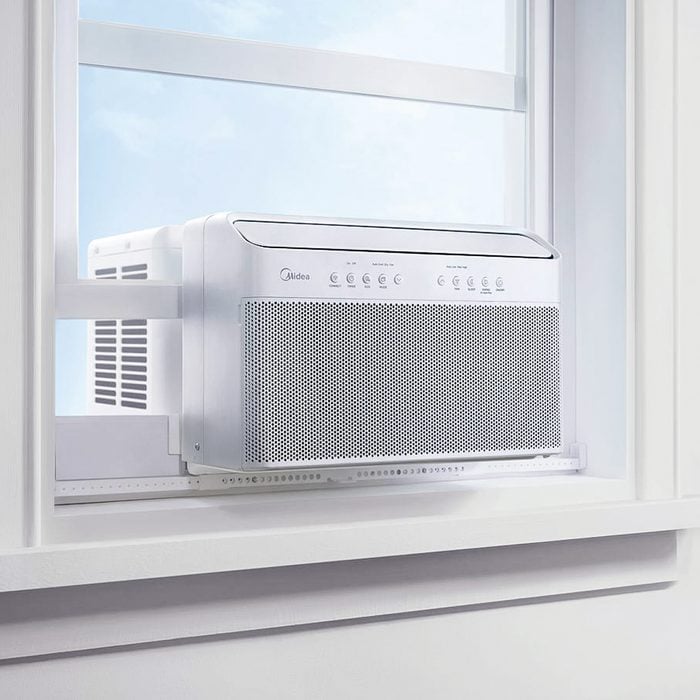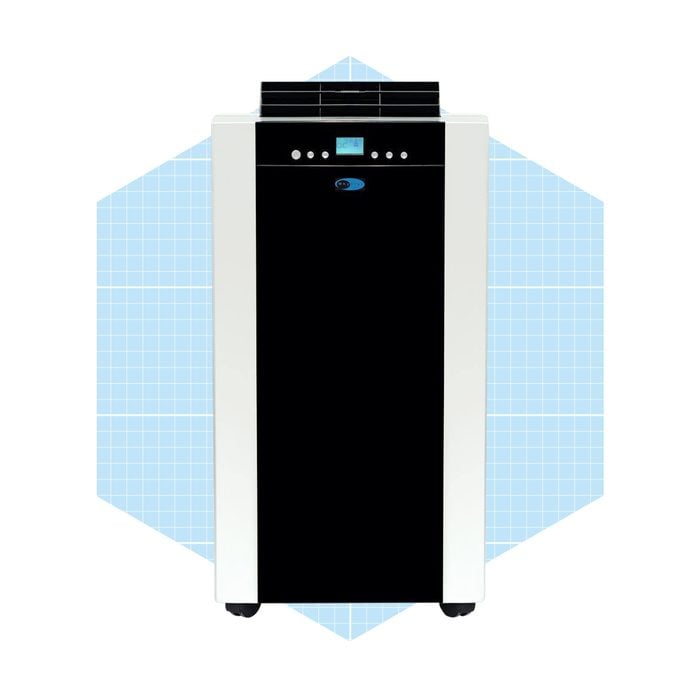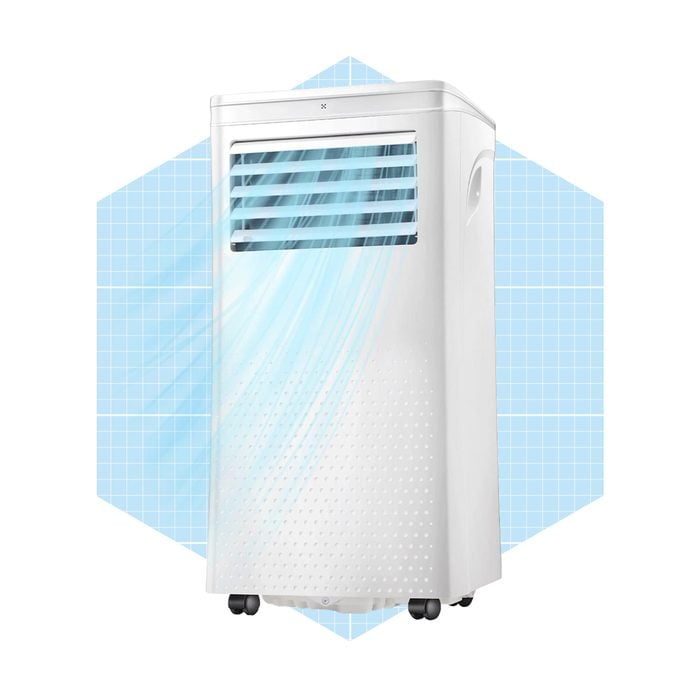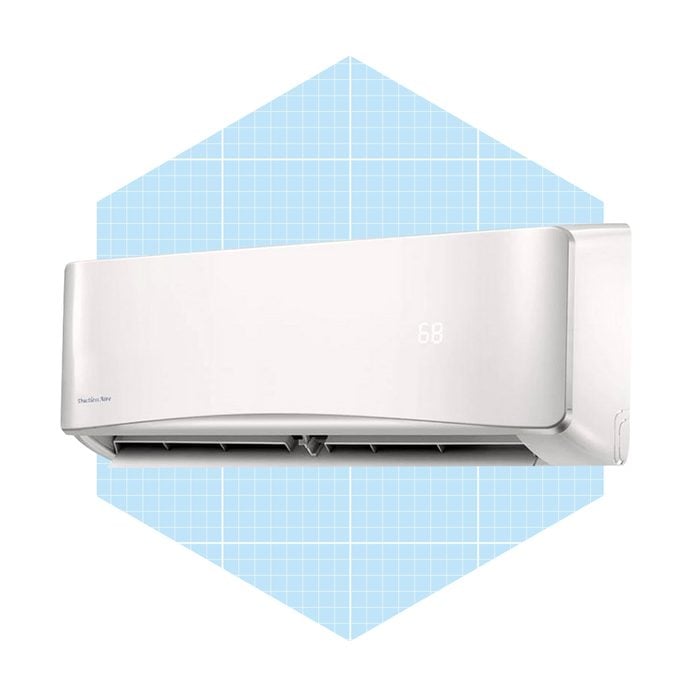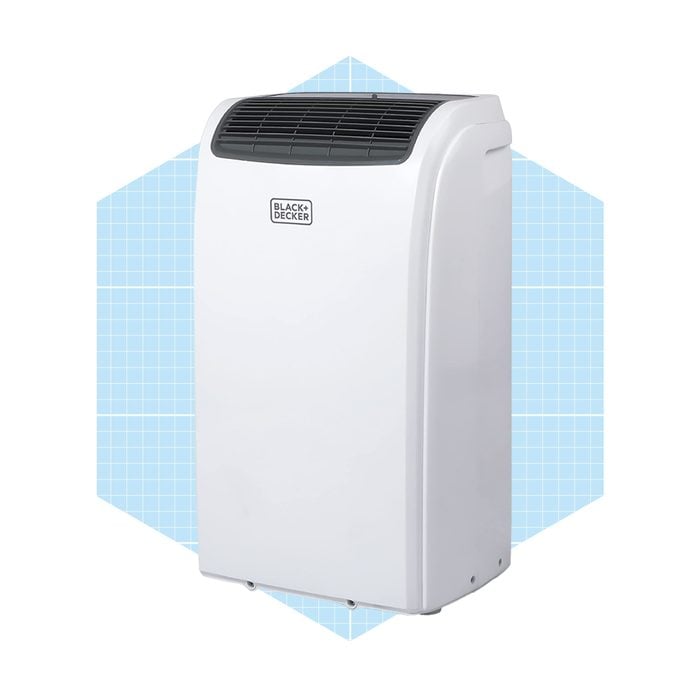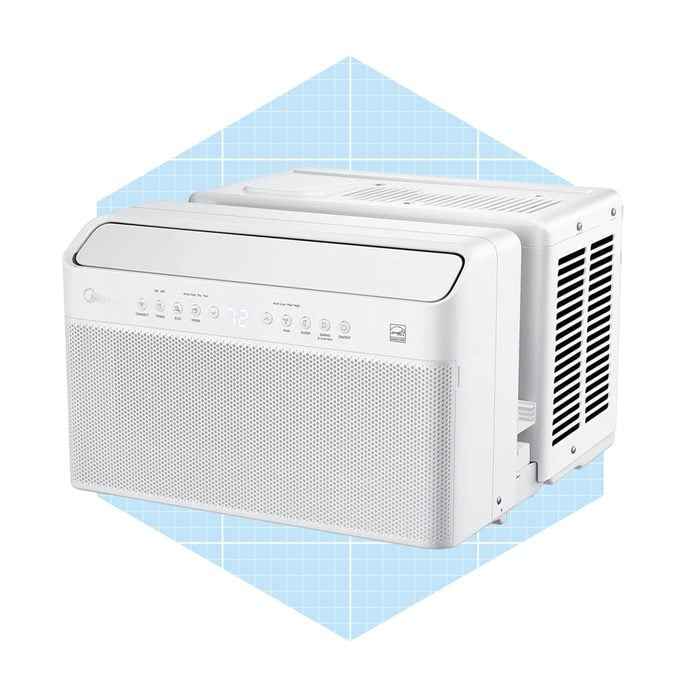 via merchant
via merchant
For those living in warm and dry climates, a swamp cooler may be the best bet for keeping a garage cool on hot days. We particularly like this 3-in-1 evaporative cooler from Cozzyben as it provides an inexpensive solution for your garage cooling needs. In addition to cooling, the unit also serves as a fan and dehumidifier. Plus it’s remote-control and portable, wheeled design means you can put it anywhere that’s convenient.
The Cozzyben 3-in-1 cooling fan blows 2,100 CFM of air over an evaporator, which contains a 5.3-gallon water capacity and four reusable ice packs to increase the unit’s cooling power. The evaporative cooler can only run for around 10 hours before needing a water refill—but that should be just enough to keep the garage temperature down through the hottest part of the day.
Pros
- Uses air and water to cool instead of Freon
- Humidifies dry air for increased comfort
- Inexpensive and energy-efficient compared to an AC unit
- Remote controlled
Cons
- Requires refilling for proper functioning
What to Look for When Buying a Garage Air Conditioner
Conditioning air in your home may not seem as unusual as cooling your garage. However, choosing a garage air conditioning solution is easier than it might sound. First, determine whether spending the money on garage air conditioning is worth it. The best air conditioning method, or one of the best garage heaters, for that matter, won’t mean much to you if it’s not a necessity. As Brad Roberson tells us, “It’s important to consider the size of the garage, how well-insulated it is, the available power supply, and how often you use the space.”
Consider the following factors when choosing the garage air conditioning solution that’s right for your home.
Garage Size, Layout and Insulation
Ensure the BTUs (or cooling power) are sufficient for the size of your garage. Single-car garages require a minimum of 6,000 BTUs; two-car garages need at least 10,000 BTUs; and so on. If you have multiple bays separated by partitions, you may need multiple units to handle that space. And it goes without saying that standalone garages will require their own individual units. Furthermore, your garage insulation will have a major effect on the efficacy of your AC. If you have virtually no insulation whatsoever, you may need a more powerful unit (or you’ll have to run yours for much longer to get the same effect).
Another thing to consider, as Brad Roberson tells us, is available power. “A power supply will be needed for all these options. You don’t want to use extension cords when plugging in portable or window units.” That means picking a spot where your AC’s cable can reach an outlet without needing an extension cord, which may limit your options somewhat.
Heating Option
Determine whether you would benefit from also having heating capabilities in addition to cooling. If you live in a place that experiences long, harsh, snowy winters, you could also benefit from heating. But not all garage ACs have a heating option, so keep that in mind when shopping if you’re interested in it. However, heating is usually very secondary and not always necessary. Make sure you ask yourself if it’s worth the investment, both because a combo AC/heater will cost more at the outset and because it will cost more to operate overall.
Energy Efficiency
Look for efficiency to save on energy bills, and consider how often your AC will need to operate. But first, “Insulate the garage properly,” Brad Roberson says. An AC unit is only as good as the building it’s in. If the building doesn’t hold in the cold air, the AC unit has to work harder. Furthermore, the number of windows also affects AC efficacy (they let in heat much quicker than solid walls). Insulation is also important when considering operating costs.
Installation
Consider the ease of installation or professional installation requirements and costs. A single-car garage with a good window for ventilation may only need a basic unit that will be easy to install yourself. However, a larger job to install a larger unit is much more complicated and may require professional help. Furthermore, there are other factors to consider, like if your garage needs insulation installed to ensure your AC unit isn’t just a money pit that doesn’t do its job very well.
Price
Ensure the pricing—including purchase, installation and operating costs—fit your budget. We know this seems like an obvious factor (and it is), but thinking critically about the size of your job and considering hidden or unexpected costs can spare you the sticker shock. Large home appliances are already an investment, so knowing what you’re getting into is very important.
Portability
“Homeowners can consider portable air conditioners as they are designed to be moved from room to room,” says Brad Roberson. Prioritize portability if you plan to move the unit seasonally (uninstalling a portable AC unit can save on energy costs in the winter, as you can better seal your windows) or around the garage for other uses (for example, from the workshop to the garage gym). But remember that, for the most part, an AC unit is best served as a static device you don’t move around.
Ventilation
Don’t forget that all AC units—portable ones, mini-splits, and full-on units—require some ventilation. At the very least, that means you need a window out of which you can vent. If that’s not an option, you might have to devise another solution to your garage heating issues. But as Brad Roberson tells us, “Mini-splits don’t require ventilation within the garage as the heat is expelled outside through the condenser unit,” which is a little bit of an edge (though they still need to run a cable from inside to outside, just not one as big as a vent tube).
Why You Should Trust Us
I, Deane Biermeier, have worked in residential construction, contracting, remodeling, maintenance and home repair for 30 years. My passion is helping people discover the potential hidden in every home’s walls and providing the information and tools needed to take control of home repairs and remodeling pursuits.
I also consulted Brad Roberson, president of Aire Serv (a Neighborly brand), a trusted name in heating and air conditioning installation, maintenance and repair. Brad has almost 20 years of experience.
How We Found the Best Garage Air Conditioning Solutions
Our resident expert and author has spent over 30 years in the home repair and remodeling industries and understands the importance of choosing the appropriate home systems to achieve the desired results. After pouring over details of numerous garage air conditioning brands and products, each one was evaluated and ranked using a variety of metrics to measure the competitors’ effectiveness, economics and practicality.
FAQs
What type of air conditioner is best for a garage?
The best type of air conditioner for a garage depends on your goals and budget. Nothing beats a mini-split system for heating and cooling a garage. However, portable air conditioners are less expensive and easier to install, and some can also offer heating capabilities. Window air conditioners are increasing in efficiency, and new designs allow them to fit more window sizes.
What size air conditioner do I need for a 2 car garage?
“It’s important to consider the size of the garage, how well-insulated it is, the available power supply, and how often you use the space,” says Brad Roberson. Generally, a two-car garage requires at least 10,000 BTUs for air conditioning. However, the final number must consider the garage’s insulation, the regional climate and average temperature and how often the garage’s interior air is exposed to hot outside air.
What is the cheapest way to air condition a garage?
The cheapest ways to air condition a garage are to insulate well, allow natural venting, open the garage door to vent hot air occasionally, run a garage fan or install a properly sized air conditioner that fits your budget. Brad Roberson adds that it also depends on the garage itself, saying, “If there are no windows, it may be best to install a mini split. If the garage has windows, portable and window units can be a good solution depending on if the garage is well insulated.”
How do I determine the best placement for an air conditioner in my garage?
As Brad Roberson tells us, “Place the unit where it can evenly distribute cool air, away from direct sunlight and obstructions.” You want to avoid crowded spaces so the air can flow freely into and out of the unit. Furthermore, direct sunlight can shorten the lifespan of your unit.





















